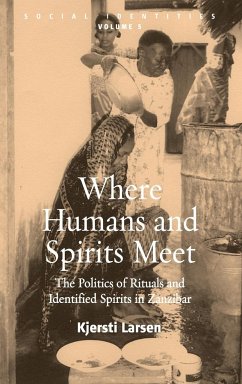Kjersti Larsen
Where Humans and Spirits Meet
The Politics of Rituals and Identified Spirits in Zanzibar
Kjersti Larsen
Where Humans and Spirits Meet
The Politics of Rituals and Identified Spirits in Zanzibar
- Gebundenes Buch
- Merkliste
- Auf die Merkliste
- Bewerten Bewerten
- Teilen
- Produkt teilen
- Produkterinnerung
- Produkterinnerung
Zanzibar, an island off the East African coast, with its Muslim and Swahili population, offers rich material for this study of identity, religion, and multiculturalism. This book focuses on the phenomenon of spirit possession in Zanzibar Town and the relationships created between humans and spirits; it provides a way to apprehend how society is constituted and conceived and, thus, discusses Zanzibari understandings of what it means to be human.
Andere Kunden interessierten sich auch für
![Where Science and Religion Meet Hardcover Where Science and Religion Meet Hardcover]() William Scott PalmerWhere Science and Religion Meet Hardcover23,99 €
William Scott PalmerWhere Science and Religion Meet Hardcover23,99 €![Where the Nations Meet Where the Nations Meet]() Stephen A. RhodesWhere the Nations Meet32,99 €
Stephen A. RhodesWhere the Nations Meet32,99 €![I Would Gladly Meet You Half Way If I Knew Where To Start: God Knows My Life I Would Gladly Meet You Half Way If I Knew Where To Start: God Knows My Life]() Jerry ManukinI Would Gladly Meet You Half Way If I Knew Where To Start: God Knows My Life18,99 €
Jerry ManukinI Would Gladly Meet You Half Way If I Knew Where To Start: God Knows My Life18,99 €![The Seven Spirits of God -- Building According to the Pattern of the Kingdom The Seven Spirits of God -- Building According to the Pattern of the Kingdom]() J. Scott HustedThe Seven Spirits of God -- Building According to the Pattern of the Kingdom50,99 €
J. Scott HustedThe Seven Spirits of God -- Building According to the Pattern of the Kingdom50,99 €![Digital Spirits in Religion and Media Digital Spirits in Religion and Media]() Alvin Eng Hui LimDigital Spirits in Religion and Media221,99 €
Alvin Eng Hui LimDigital Spirits in Religion and Media221,99 €![Living with Spirits Good and Bad Living with Spirits Good and Bad]() Robert D. McPheeLiving with Spirits Good and Bad29,99 €
Robert D. McPheeLiving with Spirits Good and Bad29,99 €![Where in Hell Did This Come From? Where in Hell Did This Come From?]() L. J. BeatoWhere in Hell Did This Come From?33,99 €
L. J. BeatoWhere in Hell Did This Come From?33,99 €-
-
-
Zanzibar, an island off the East African coast, with its Muslim and Swahili population, offers rich material for this study of identity, religion, and multiculturalism. This book focuses on the phenomenon of spirit possession in Zanzibar Town and the relationships created between humans and spirits; it provides a way to apprehend how society is constituted and conceived and, thus, discusses Zanzibari understandings of what it means to be human.
Hinweis: Dieser Artikel kann nur an eine deutsche Lieferadresse ausgeliefert werden.
Hinweis: Dieser Artikel kann nur an eine deutsche Lieferadresse ausgeliefert werden.
Produktdetails
- Produktdetails
- Verlag: Berghahn Books
- Seitenzahl: 184
- Erscheinungstermin: 1. Juni 2008
- Englisch
- Abmessung: 235mm x 157mm x 15mm
- Gewicht: 426g
- ISBN-13: 9781845450557
- ISBN-10: 1845450558
- Artikelnr.: 44842401
- Herstellerkennzeichnung
- Books on Demand GmbH
- In de Tarpen 42
- 22848 Norderstedt
- info@bod.de
- 040 53433511
- Verlag: Berghahn Books
- Seitenzahl: 184
- Erscheinungstermin: 1. Juni 2008
- Englisch
- Abmessung: 235mm x 157mm x 15mm
- Gewicht: 426g
- ISBN-13: 9781845450557
- ISBN-10: 1845450558
- Artikelnr.: 44842401
- Herstellerkennzeichnung
- Books on Demand GmbH
- In de Tarpen 42
- 22848 Norderstedt
- info@bod.de
- 040 53433511
Kjersti Larsen is Associate Professor of Social Anthropology and African Studies at the Department of Ethnography, Museum of Cultural History, University of Oslo. She has carried out fieldwork in Zanzibar since 1984 and since 1997 has also conducted fieldwork in Northern Sudan.
Map of the Western Indian Ocean
Preface and Acknowledgements
Chapter 1. Introduction
* Considering perspectives on spirit possession
* The fieldwork: people, engagement and context
* The fieldwork: ritual participation
* Performance, meaning and reflexivity
* Ritual, communication and enactment
* Knowledge, experience and forms of negotiation
* The book
Chapter 2. Introduction to Zanzibar: the place, its politics and
organization
* A view of the past and the present
* Identity, social privileges and political reorganization
* A plural society
* Gender, distinctions and effects in everyday and ritual life
* Gender, ritual participation and knowledge
Chapter 3. Spirits, possession and personhood
* The position of spirits
* Spirits are beings with a worldly existence
* Spirit possession and practices
* Personhood, notions of strength and self-control
* Experiencing spirits
Chapter 4. Makabila, people and spirits
* Articulation of differences and the problem of identity
* Identification of a spirit
* The demands of spirits belonging to different makabila
* The world of spirits and human beings
Chapter 5. Human concerns, spirits and recreation of relationships
* How the spirits reveal their presence in the human world
* Communication between humans and spirits
* The ritual group and the ritual framework
* Ngoma ya sheitani: a celebration and a cure
Chapter 6. Between self and other: body and mind
* Ngoma ya ruhani
* States of body and states of mind
* A bodily experience of spirits
* Losing oneself to the spirit
* Altered states of body, altered states of mind
Chapter 7. Gender: relations, markers and sexuality
* Gender and complementarity
* Concealment and disclosure
* Acts of disclosure and moral ambiguity
* Enactment and perceptions of the body
* Strict categories in a flexible universe
* Gender images and human practices
Chapter 8. Women, men and gendered spirits
* A ngoma ya kibuki ritual
* Matters of affection, pride and self-control
* Presentation, representation and excess
* Comedy, parody and the ways of humans and spirits
* Body, aesthetics, and gender images
* On reflections and acts of transgression
Chapter 9. Conclusion: social identities and dramatization of the other
* An aesthetic moving together
* Improvisation, play and the dramatization of a life-world
* Reflections on embodiment and modes of knowing
Glossary
Bibliography
Index
Preface and Acknowledgements
Chapter 1. Introduction
* Considering perspectives on spirit possession
* The fieldwork: people, engagement and context
* The fieldwork: ritual participation
* Performance, meaning and reflexivity
* Ritual, communication and enactment
* Knowledge, experience and forms of negotiation
* The book
Chapter 2. Introduction to Zanzibar: the place, its politics and
organization
* A view of the past and the present
* Identity, social privileges and political reorganization
* A plural society
* Gender, distinctions and effects in everyday and ritual life
* Gender, ritual participation and knowledge
Chapter 3. Spirits, possession and personhood
* The position of spirits
* Spirits are beings with a worldly existence
* Spirit possession and practices
* Personhood, notions of strength and self-control
* Experiencing spirits
Chapter 4. Makabila, people and spirits
* Articulation of differences and the problem of identity
* Identification of a spirit
* The demands of spirits belonging to different makabila
* The world of spirits and human beings
Chapter 5. Human concerns, spirits and recreation of relationships
* How the spirits reveal their presence in the human world
* Communication between humans and spirits
* The ritual group and the ritual framework
* Ngoma ya sheitani: a celebration and a cure
Chapter 6. Between self and other: body and mind
* Ngoma ya ruhani
* States of body and states of mind
* A bodily experience of spirits
* Losing oneself to the spirit
* Altered states of body, altered states of mind
Chapter 7. Gender: relations, markers and sexuality
* Gender and complementarity
* Concealment and disclosure
* Acts of disclosure and moral ambiguity
* Enactment and perceptions of the body
* Strict categories in a flexible universe
* Gender images and human practices
Chapter 8. Women, men and gendered spirits
* A ngoma ya kibuki ritual
* Matters of affection, pride and self-control
* Presentation, representation and excess
* Comedy, parody and the ways of humans and spirits
* Body, aesthetics, and gender images
* On reflections and acts of transgression
Chapter 9. Conclusion: social identities and dramatization of the other
* An aesthetic moving together
* Improvisation, play and the dramatization of a life-world
* Reflections on embodiment and modes of knowing
Glossary
Bibliography
Index
Map of the Western Indian Ocean
Preface and Acknowledgements
Chapter 1. Introduction
* Considering perspectives on spirit possession
* The fieldwork: people, engagement and context
* The fieldwork: ritual participation
* Performance, meaning and reflexivity
* Ritual, communication and enactment
* Knowledge, experience and forms of negotiation
* The book
Chapter 2. Introduction to Zanzibar: the place, its politics and
organization
* A view of the past and the present
* Identity, social privileges and political reorganization
* A plural society
* Gender, distinctions and effects in everyday and ritual life
* Gender, ritual participation and knowledge
Chapter 3. Spirits, possession and personhood
* The position of spirits
* Spirits are beings with a worldly existence
* Spirit possession and practices
* Personhood, notions of strength and self-control
* Experiencing spirits
Chapter 4. Makabila, people and spirits
* Articulation of differences and the problem of identity
* Identification of a spirit
* The demands of spirits belonging to different makabila
* The world of spirits and human beings
Chapter 5. Human concerns, spirits and recreation of relationships
* How the spirits reveal their presence in the human world
* Communication between humans and spirits
* The ritual group and the ritual framework
* Ngoma ya sheitani: a celebration and a cure
Chapter 6. Between self and other: body and mind
* Ngoma ya ruhani
* States of body and states of mind
* A bodily experience of spirits
* Losing oneself to the spirit
* Altered states of body, altered states of mind
Chapter 7. Gender: relations, markers and sexuality
* Gender and complementarity
* Concealment and disclosure
* Acts of disclosure and moral ambiguity
* Enactment and perceptions of the body
* Strict categories in a flexible universe
* Gender images and human practices
Chapter 8. Women, men and gendered spirits
* A ngoma ya kibuki ritual
* Matters of affection, pride and self-control
* Presentation, representation and excess
* Comedy, parody and the ways of humans and spirits
* Body, aesthetics, and gender images
* On reflections and acts of transgression
Chapter 9. Conclusion: social identities and dramatization of the other
* An aesthetic moving together
* Improvisation, play and the dramatization of a life-world
* Reflections on embodiment and modes of knowing
Glossary
Bibliography
Index
Preface and Acknowledgements
Chapter 1. Introduction
* Considering perspectives on spirit possession
* The fieldwork: people, engagement and context
* The fieldwork: ritual participation
* Performance, meaning and reflexivity
* Ritual, communication and enactment
* Knowledge, experience and forms of negotiation
* The book
Chapter 2. Introduction to Zanzibar: the place, its politics and
organization
* A view of the past and the present
* Identity, social privileges and political reorganization
* A plural society
* Gender, distinctions and effects in everyday and ritual life
* Gender, ritual participation and knowledge
Chapter 3. Spirits, possession and personhood
* The position of spirits
* Spirits are beings with a worldly existence
* Spirit possession and practices
* Personhood, notions of strength and self-control
* Experiencing spirits
Chapter 4. Makabila, people and spirits
* Articulation of differences and the problem of identity
* Identification of a spirit
* The demands of spirits belonging to different makabila
* The world of spirits and human beings
Chapter 5. Human concerns, spirits and recreation of relationships
* How the spirits reveal their presence in the human world
* Communication between humans and spirits
* The ritual group and the ritual framework
* Ngoma ya sheitani: a celebration and a cure
Chapter 6. Between self and other: body and mind
* Ngoma ya ruhani
* States of body and states of mind
* A bodily experience of spirits
* Losing oneself to the spirit
* Altered states of body, altered states of mind
Chapter 7. Gender: relations, markers and sexuality
* Gender and complementarity
* Concealment and disclosure
* Acts of disclosure and moral ambiguity
* Enactment and perceptions of the body
* Strict categories in a flexible universe
* Gender images and human practices
Chapter 8. Women, men and gendered spirits
* A ngoma ya kibuki ritual
* Matters of affection, pride and self-control
* Presentation, representation and excess
* Comedy, parody and the ways of humans and spirits
* Body, aesthetics, and gender images
* On reflections and acts of transgression
Chapter 9. Conclusion: social identities and dramatization of the other
* An aesthetic moving together
* Improvisation, play and the dramatization of a life-world
* Reflections on embodiment and modes of knowing
Glossary
Bibliography
Index








